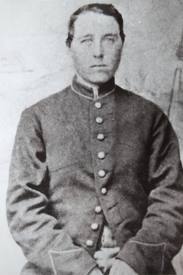The life and times of Private Albert D.J. Cashier are one of those historic anomalies that make you scratch your head and wonder, ‘How the hell could that happen?’
Private Cashier served in the ranks of the 95th Illinois for three years – from their muster-in on September 4, 1862, until the regiment was discharged in August 1865.
Cashier was a member of the regiment’s Company G, and was present at hard-fought battles like Vicksburg and Nashville. A comrade later remembered Cashier as being the type of person who preferred their own company and who never took part in any of the sports or games that were organised by the unit.
Pictured, Private Cashier aka Jennie Hodgers
So far so unremarkable, but the other distinguishing thing about Private Cashier was that the soldier was, in fact, a woman by the name of Jennie Hodgers.
In his book, The Irish in the American Civil War, Damian Shiels documents the fascinating story of Hodgers, who was born in Clogherhead, County Louth, in 1843.
Jennie emigrated to the United States shortly before the outbreak of the Civil War. It is thought her uncle may have got her a job in an all-male shoe factory on her arrival – a position that may have opened her eyes to the possibilities of masquerading as a man.
If that is the case then it certainly prompted her to take on an extraordinary challenge when she presented herself for enlistment in Belvidere, Illinois on August 3, 1862 as one Albert Cashier.
There was no medical examination conducted and so she was duly signed up, spending the next three years with her regiment marching across the South without her secret ever being discovered.
Jennie remained in the guise of ‘Albert Cashier’ after the war, even spending time working as a labourer before moving to Saunemin, Illinois, in 1869, where she continued to live her life as a man for the next 40 years.
At one stage, through illness and an injury to her leg, Cashier’s true sex was revealed to her friends, but they kept her secret. It wasn’t until her old age, when Jennie moved to the Soldiers and Sailors Home in Quincy, Illinois, in 1913, that the truth about Jennie / Albert finally came out.
The news caused a sensation. A reporter writing in the The Hartford Republican went to visit Cashier and described the scene: I had expected to meet an amazon. A woman who had fought in the death grapple of a nation and had lived and toiled as a man through half a century should be big, strong and masculine. And when I entered her hospital ward there rose and came to meet me, in her faded soldier’s uniform, just a little frail, sweet-faced, old-lady, who might be anybody’s grandmother.
Poor Jennie / Albert was eventually moved to an insane asylum, where she died October 11, 1914. The headstone in the local cemetery now bears both her names – Albert Cashier, the former Union soldier, and Jennie Hodgers, the woman who gave as good as she got in a man’s world.


Claire Fullerton
Interesting, David. But I do wonder how it came to be that she was eventually moved to an insane asylum, as in if there were any other causes beyond her being discovered as a woman.
Sep 26, 2015
David Lawlor
I suspect the idea of cross-dressing males or females was regarded with horror in those times - an illness of the mind that needed to be treated in a suitable environment, probably with shock therapy. Happily, we've moved on, somewhat, from those days.
Sep 27, 2015
Claire Fullerton
As I suspected, yet wanted to hear it from you!
Sep 27, 2015
Jill Fuller
David, great article. Coincidentally enough, I'm the local history librarian in Belvidere, Illinois where Jennie enlisted. Our local museum has a whole exhibit on her and she got a full page in a recent local history book that was published. She is definitely remembered around here! I love her story and find it inspirational. Thanks for sharing your insight here!
Sep 28, 2015
David Lawlor
Thank you, Jill. It's great to know that she has not been forgotten and is recognised for her unique contribution to both millitary and social history
Sep 28, 2015